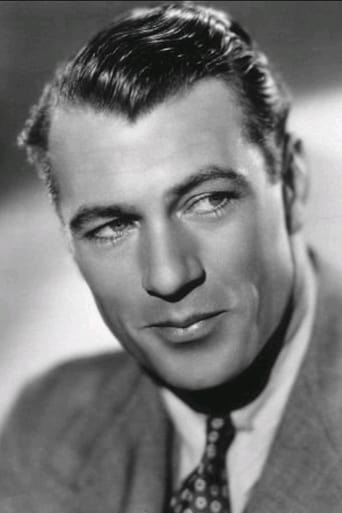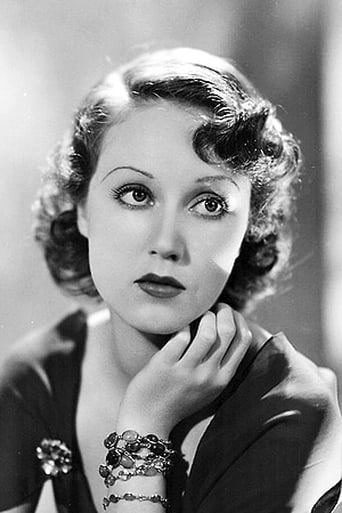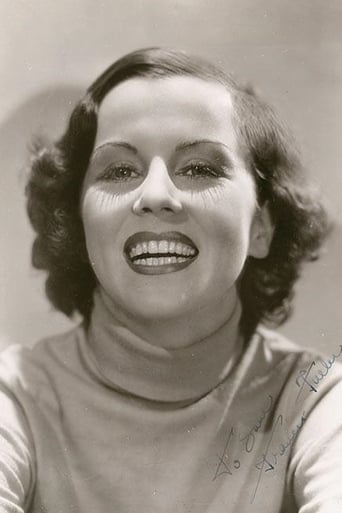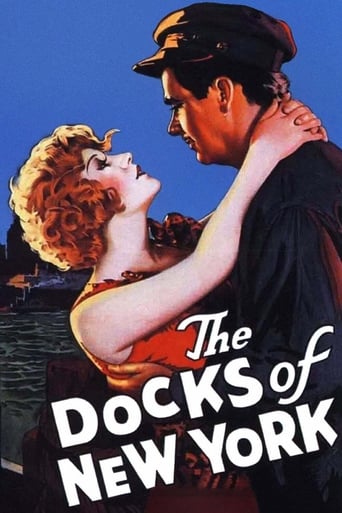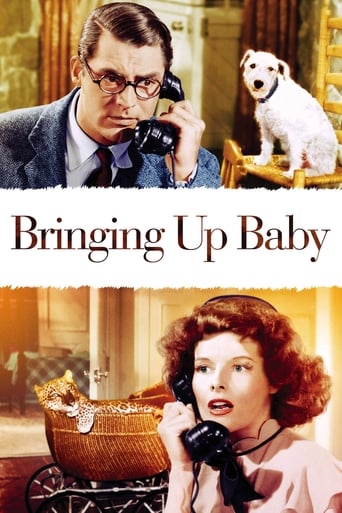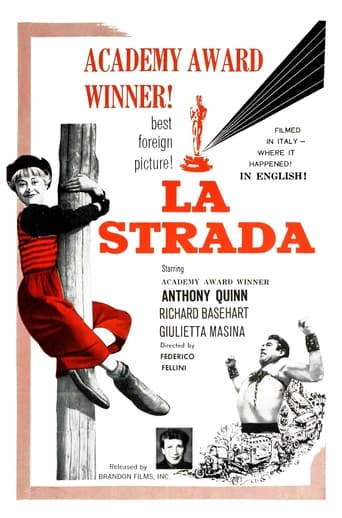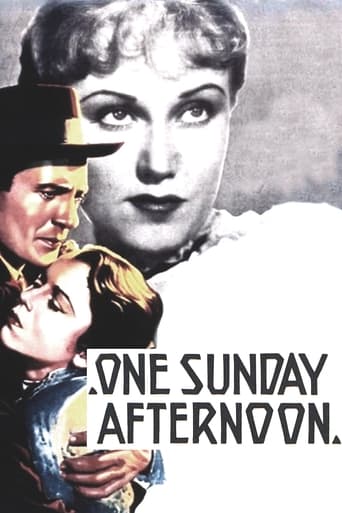
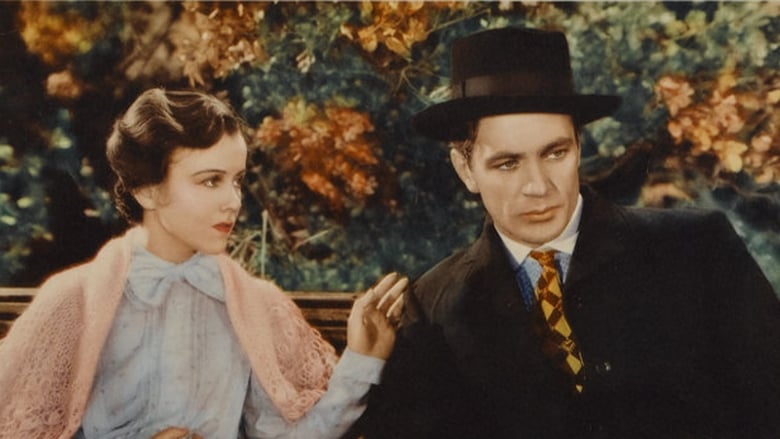
One Sunday Afternoon (1933)
Middle-aged dentist Biff Grimes reminisces about his unrequited love for beautiful Virginia Brush and her husband Hugo, his ex-friend, who betrayed him.
Watch Trailer
Cast
Similar titles



Reviews
it is finally so absorbing because it plays like a lyrical road odyssey that’s also a detective story.
Like the great film, it's made with a great deal of visible affection both in front of and behind the camera.
True to its essence, the characters remain on the same line and manage to entertain the viewer, each highlighting their own distinctive qualities or touches.
An old-fashioned movie made with new-fashioned finesse.
One Sunday Afternoon (Stephen Roberts, 1933) is a small masterpiece, vastly superior to its better-known remake, The Strawberry Blonde – which starred James Cagney. Gary Cooper plays a dentist besotted with the flirtatious, hateful Fay Wray. When she marries his rival, Cooper weds sweet-hearted admirer Frances Fuller, but he's unable to forget his great love. Then, years later, she walks back into his life. Cooper was a fine comic performer, adept at screwball fare like Bluebeard's Eighth Wife, but also able to inject humour into his straighter work. He's ideally suited to this wonderfully-scripted movie, an incisive marital drama laced with irony that offers considerable concessions to character comedy. Stage star and future acting teacher Frances Fuller is arguably even better in a rare screen role: loving, faithful and stoic, though she knows her husband's heart lies elsewhere. As the other woman, Wray is only fairly good, possibly overdoing it in the last scene, though Roscoe Karns offers his usual combination of laughs and laconic sentiment in support. The film has a singular feel, with the plot concisely, intelligently handled, allowing each scene to play out effectively, despite the short running time. It is book-ended by contemporary scenes showing the greying Cooper plagued by his nagging wife, shown only in silhouette, making us complicit in his bitterness – at least at first. One Sunday Afternoon is short but not slight: delightfully played, perfectly-formed and with a lovely message somewhat atypical of '30s Hollywood.
If you're looking for a pleasant story about a bygone age, this is not it. The 1941 remake with James Cagney, Olivia de Havilland and Rita Hayworth was much more enjoyable, with expertly shaded performances from the three stars and a bouncy score for a musical background, dealing as it does with turn-of-the-century's 1900 era.This is the more somber, muted version with an unappealing central performance by GARY COOPER as Biff Grimes, the lovestruck man who thinks about his past when he let Virginia (FAY WRAY) marry his best friend (NEIL HAMILTON), and ended up with his second choice (FRANCES FULLER) for his wife.The pace of the story is leaden and dull, with no musical background at all for most of the scenes. None of the players strike the kind of sparks that were evident in the later version, letting good opportunities for character development pass right by--although this is more the fault of the script (from the James Hagan play) and director Stephen Roberts. It's a pretty trite script, completely devoid of the kind of humor and spunkiness on the part of Amy as played by Olivia de Havilland in Raoul Walsh's version. Fuller has to play Amy like a dull simpleton. NEIL HAMILTON's Hugo Barnstead is a far darker version than the amusing heel, as played by Jack Carson in the Cagney film.Cooper's fans will probably forgive him for a performance that lacks the luster Cagney gave it, but the film is a lackluster version of the story which reached the screen three times in remakes. His Biff is not the charming sort of guy to attract a girl like Amy--in fact, her interest in him is puzzling, to say the least.A charming tale has been turned into a dreary story with uninspired direction. The characters and their motivations are entirely different from those in the more successful version where both women have well-written roles and the humor is much more emphasized.Summing up: The vast difference in approach spoils this version for me.
There are three versions of this movie and hands-down this is the best. I of course adore James Cagney, Rita Hayworth and Olivia De Haviland in The Strawberry Blonde but this version is the best. Gary Cooper, aka Biff Grimes, is smitten with Virginia, aka Fay Wray. Ms Virginia was not interested in the simple Biff. Amy, aka Florence Fuller, has had a crush on Biff since grade school. Virginia is no more attracted to Biff than I can fly. Near the beginning when Biff is trying to impress Virginia there's a scene where he's winding around a tree ala true county bumpkin style, it's wonderful. And hanging upside-down on a Merry-go-Round ride, is too darling. The beginning of the movie gives away what happens but the whole 85 minutes is a treasure showing the road of the trials and tribulations. The real eye-opener of what's real and right is exposed in this lovely film.
One Sunday Afternoon is an example of what movie studios used to do with total professionalism - in the space of a few months, use a Broadway play as the template to make a movie. One Sunday Afternoon opened on Broadway on February 15, 1933; the movie went into production at Paramount in May 1933 and was released on September 1, 1933, while the original play was still at the Little Theater. Grand Hotel is another example of a Broadway play becoming a movie in a relatively short time.Warner Bros. turned the play Arsenic and Old Lace into a movie after the play was a hit on Broadway, but by then, the play's producer knew the score. One Sunday Afternoon closed on Broadway in November 1933, a closure that probably was sped up by competition from the movie. As a condition of the sale of movie rights, the movie Arsenic and Old Lace, made in 1941, could not be released until the play it was based on closed on Broadway. That was in 1944.Back to One Sunday Afternoon, the movie. As with many movies made during the Depression, this movie has a grim edge to it. Although things work out, all the leads have rough times of it. Fay Wray is cast against her usual role, playing a mean person. Gary Cooper is no hero, just a guy who gets jammed by people he trusted. Frances Fuller (Amy Lind) does not change much during the movie, she always believes in Biff Grimes (Cooper). She made one more movie in Hollywood as a lead character before vanishing until some television roles over 15 years later, so she did not have a chance to be typecast.The end result of Paramount's production is a movie that shows what a struggle life is, and how people can change along the way. Instead of cheerful memories of a time gone by, which the title implies, you have scenes such as Gary Cooper returning from prison to meet Amy in Avery's Park, an amusement park that closed and fell into disrepair while Cooper was in prison.One Sunday Afternoon is a slice of real life, a movie that deals with hard times for some ordinary (but very good looking) people.
